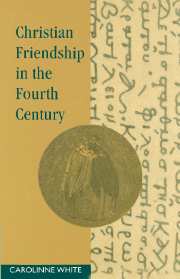Book contents
- Frontmatter
- Contents
- Preface
- Abbreviations
- 1 Introduction
- 2 Classical theories of friendship
- 3 Some problems of Christian friendship
- 4 Friendship in the lives and thought of Basil and of Gregory of Nazianzus
- 5 John Chrysostom and Olympias
- 6 Synesius of Cyrene
- 7 Ambrose of Milan – Ciceronian or Christian friendship?
- 8 St Jerome
- 9 Paulinus of Nola
- 10 Monasticism and friendship
- 11 St Augustine
- Conclusion
- Notes
- Editions and translations of primary sources
- Select bibliography
- Index
- Frontmatter
- Contents
- Preface
- Abbreviations
- 1 Introduction
- 2 Classical theories of friendship
- 3 Some problems of Christian friendship
- 4 Friendship in the lives and thought of Basil and of Gregory of Nazianzus
- 5 John Chrysostom and Olympias
- 6 Synesius of Cyrene
- 7 Ambrose of Milan – Ciceronian or Christian friendship?
- 8 St Jerome
- 9 Paulinus of Nola
- 10 Monasticism and friendship
- 11 St Augustine
- Conclusion
- Notes
- Editions and translations of primary sources
- Select bibliography
- Index
Summary
Throughout Augustine's long life (354–430) friendship was to play an important part, both in his everyday relations with others and in his thought. He valued his close friends highly and many of them remained his friends from youth to old age, men such as Alypius and Severus who, like Augustine himself, became bishops in North Africa. Other friendships developed in later life, as in the case of the government official Marcellinus whom Augustine became acquainted with at the time of the council of Carthage in 411 and with whom he maintained a correspondence when they were separated until Marcellinus' execution in 413. Augustine could also maintain affectionate relations over a number of years with men whom he had never met, as with Paulinus at Nola, with whom a friendship developed through their correspondence because they could recognise the friendly feelings each had for the other and they both adhered to the same Christian ideals. Although Augustine's thought was not static and he was led by a variety of factors to adapt his early ideas on many subjects in the course of his life, it is nevertheless accurate to say that he remained true to the ideal of friendship, in one way or another constantly giving it a central place in his way of life and in his theology, relating it closely to his idea of the supreme good (summum bonum) in terms of which his theological ideas were frequently expressed.
- Type
- Chapter
- Information
- Christian Friendship in the Fourth Century , pp. 185 - 217Publisher: Cambridge University PressPrint publication year: 1992



